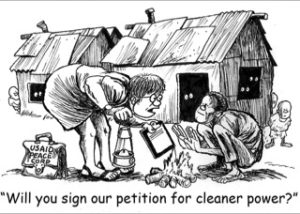If Donald Trump scares you, look away now.
The row over fossil fuels and “clean coal” that some say won him the election has surfaced in Australia.
And it resonates in the EU and Africa, especially Zimbabwe.
In July 2016, Aussie prime minister Malcolm Turnbull went to the polls, defeating the opposition Labor Party by less than one per cent of the vote.
But he has only 30 out of 76 seats in the all-powerful Senate, and rules at the mercy of independents
Now, Labor state governments in Queensland and Victoria along with the opposition want the country to stop making electricity from fossil fuels. By 2030, they say, 50 per cent should come from renewables like wind or solar. It currently stands at 15 per cent and Mr Turnbull wants nearly a quarter of all power to be green by 2020.
And because of this, the PM may be fighting an old rival for his job.
In 2013, Tony Abbott led a conservative coalition to victory but, as his popularity slumped, Malcolm Turnbull mounted a challenge and toppled the new prime minister.
Abbott stayed on as an MP.
As Canberra came back from the Christmas break, Mr Abbott wrote an opinion piece in the country’s biggest national daily.
- The opposition plan for 50 per cent renewable energy, he said, would cost more than US$36bn
- But even Turnbull’s modest move from fossil fuel was a “reckless hit” on families and business who would pay more for electricity
- Government, he said, should, “be on the side of lower price and more jobs.”
- The whole idea of targets should be scrapped
Opinion polls show two-third of voters now oppose Mr Turnbull as PM and critics accuse Abbott of trying to oust him, a claim he denies.
But he has started a fight that’s unlikely to end soon.
Australia is the world’s biggest coal exporter, but in a country the size of continental USA with half the population of Kenya, keeping the lights on is a mission.
Not just generating power, but running it for thousands of kilometres to states like Queensland, twice the size of Mozambique and home to less than four million people.
Ambitious plans for green energy don’t win votes if it means a rise in cost.
It’s a problem for Zimbabwe with a mix of local generation and imports from Eskom in South Africa, nearly all of it made with coal. The rest is hydro power from the world’s largest dam at Kariba.
With rich seams of coal in Matabeleland North, Zimbabwe should have an excess of kilowatts, but since ZANU-PF took over in 1980 there has been little investment. Outages are common, and urban connections are slow as ever-more people move to town in search of work.
Aid groups and NGOs have been pushing for a greener future, but if that’s hard in southern Africa, it’s more difficult elsewhere on the continent where more than half-a-billion people are not even on the grid.
After the Abbott attack, Canberra released a report commissioned by Mr Turnbull, showing the country could reach its carbon target by installing new, coal-fired technology that cuts emissions by up to 27 per cent.
Resources minister Matt Canavan who led the research said, “People who oppose the coal industry for ideological reasons are incorrectly claiming its days are numbered.
“Hi-tech coal-fired stations,” he said, “can be an important tool,” in cooling the planet.
The technology is already being used in China, Japan, India, Korea and the US.
By the time he addressed the National Press Club last week, prime minister Turnbull had undergone a conversion. Australia, he said, “has the highest energy costs in the OECD.†Power bills were an increasing part of the household budget. Yet coal was in “abundanceâ€.
The speech, said one reporter, “could have been written by Tony Abbott.â€
The green lobby has been active in Africa, pushing alternatives at a time when Botswana, Ghana, Nigeria, Tanzania and others say they plan to use more coal in the future.
But as Australia invests billions in clean-coal generators, research is likely to make it greener and bring down the cost.
That will not stem the protest from campaigners in Europe or the USA who have never known life without electricity.
In countries like Zimbabwe, the challenge is simply to get the lights on for those still in the dark, and end the daily outages that cripple business.
The cost and supply of power has become a key issue and, as in Australia, if African leaders don’t heed the problem, someone else will make the call.
Post published in: Featured


